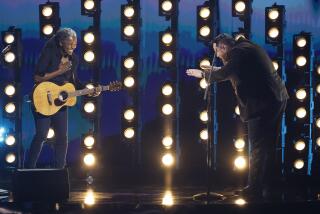Oompah and out
- Share via
The polka world was rocked -- well, maybe not rocked, but sent reeling across the cruise-ship dance floor -- when the National Academy of Recording Arts and Sciences announced this week that it was eliminating the best polka album category from the Grammy Awards. But then, what do you expect from an academy committee made up of a bunch of music industry hipsters who probably think a “squeezebox” is a new Wii controller?
Polka, the Grammy committee might be interested to learn, is an Eastern European folk-music genre that has spread around the world like sauerkraut on a bun, influencing traditional musical styles in such far-flung places as Ireland, Mexico and the United States. Johann Strauss wasn’t too proud to compose polka tunes, nor are such giants of American tunesmithery as Weird Al Yankovic.
It may be true that in this country it’s popular mainly with Midwestern Polish immigrants who were already collecting Social Security when Lawrence Welk burst his last bubble. And that the polka award category has been so dominated by a single artist -- “polka king” Jimmy Sturr, who has won 18 of the 24 awards given out -- that the honor was starting to seem like a personal tribute. And that even Sturr, while beloved by tens of Americans, is still so obscure that a contestant on “Who Wants to Be a Millionaire” once won $250,000 by successfully identifying him (a fact Sturr proudly points out on his website).
Nonetheless, polka still has plenty of oompah. There is, after all, a Polka Music Hall of Fame and Museum in Chicago; it used to be housed in its own building, but the property was sold and now the artifacts can be found in a banquet hall. A look at the hall’s online menu shows that it serves the full range of Midwestern delicacies, from chicken Kiev to stuffed cabbage. There are myriad websites for polka enthusiasts, polka radio stations, polka dancers and a wide variety of traveling polka bands.
The Grammy snobs might think that polka’s three-quarter time is up. But this is a genre that’s been around for more than a century longer than rock ‘n’ roll, and as long as there are knockwurst, hairpieces and lederhosen, it will proudly waltz on.
More to Read
The biggest entertainment stories
Get our big stories about Hollywood, film, television, music, arts, culture and more right in your inbox as soon as they publish.
You may occasionally receive promotional content from the Los Angeles Times.










